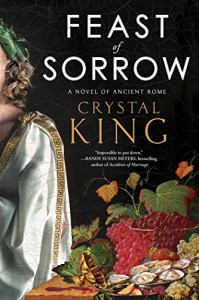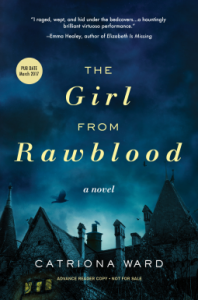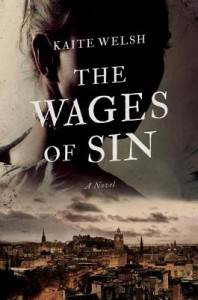Summer Reading Project, BookLikes Satellite
Never stop reading. (Content originally posted at Blogger.)
The End of the Day, by Claire North

On first impression, Claire North’s stunning and strange novel, The End of Days, is about death. Charlie is the most recent Harbinger of Death. As he explains it, he goes before as a courtesy or a warning. Through his eyes, we see good deaths and bad—and the longer you read, the more you realize that this is not a book about death so much as it is a book about empathy. I read The End of Days in chunks over two days. I would inhale the short chapters until I could take no more of its emotional honesty and have to take a break. The breaks didn’t last too long because I just had to have more...
Read the rest of my review at A Bookish Type. I received a free copy of this book from NetGalley for review consideration.
 3
3
Feast of Sorrow, by Crystal King

In Feast of Sorrow, Crystal King takes the few known historical details about the life of patrician Marcus Gavius Apicius and the cookbook named after him to create a captivating look into high Roman society in the first century CE. Through the eyes of Thrasius, Apicius’ enslaved cook, we see decades of political wrangling and lots and lots of cooking. Feast of Sorrow is deliciously rich in period detail—though I think I’ll hold off on making some of the provided recipes as I’m not all that fond of dormouse...
Read the rest of my review at A Bookish Type. I received a free copy of this book from Edeweiss for review consideration.
 3
3
The Witchfinder's Sister, by Beth Underdown

Between 1644 and 1647, Matthew Hopkins traveled through rural East Anglia killing hundreds of people. We don’t see him on the lists of history’s most prolific serial killers because his killings were officially sanctioned and quite legal. Hopkins was a witch-finder; he would be called into a town or a village to investigate, then let the town execute the accused. Beth Underdown invents a sibling to serve as a witness to Hopkin’s spree in The Witchfinder’s Sister. Through the fictional Alice’s eyes, we learn what might have led the historical man to not only investigate witchcraft but also write a manual to finding witches that was used during the Salem Witch Trials a few decades later...
Read the rest of my review at A Bookish Type. I received a free copy of this book from NetGalley for review consideration.
 3
3
The Last Bell, by Johannes Urzidil

Pushkin Press continues to do sterling work by retranslating and republishing European fiction with Johannes Urzidil’s The Last Bell (translated by David Burnett). The Last Bell includes five stories by a mid-century Czech author who got lost in the shuffle of history. In these stories, Urzidil writes about life in Prague in the late 1930s (before he himself fled Europe) and in the old Austro-Hungarian Empire before World War I...
Read the rest of my review at A Bookish Type. I received a free copy of this book from NetGalley for review consideration.
 2
2
Parnassus on Wheels, by Christopher Morley

Christopher Morley’s Parnassus on Wheels is a delightful novella about two oddballs who fall in love over books and light adventure in the early twentieth century. It’s a perfect book for bibliophiles, especially if they want something that has a happy ending (unlike my beloved The Storied Life of A.J. Fikry)...
Read the rest of my review at A Bookish Type.
 2
2
Hex, by Thomas Olde Heuvelt

The people of Black Spring, New York are cursed. It’s not really their fault. They were just unlucky enough to be born there or buy a house there. The curse is Katherine van Wyler, a woman accused of being a witch who still haunts Black Spring three hundred plus years later. In Hex, by Thomas Olde Heuvelt and translated by Nancy Forest-Flier, we learn how the Black Spring folk cope with their witch and keep her secret from the world. We also learn how a town can, if pushed down the wrong road hard enough, tear itself apart...
Read the rest of my review at A Bookish Type.
 1
1
The Zoo, by Isobel Charman

Reader, I skimmed this book. Isobel Charman’s The Zoo: The Wild and Wonderful Tale of the Founding of London Zoo, 1826-1851 is the kind of historical writing that I loathe, unfortunately. While Charman did her homework by digging through the archives of the Zoological Society of London, she writes this history as though it’s a novel, full of little vignettes of city life and the thoughts and emotions of the men who created London Zoo. The Zoo’s history is, on its own, interesting enough to sustain my interest. That’s what I wanted. So I skimmed to get the historical details and ignored what I saw as filler...
Read the rest of my review at A Bookish Type. I received a free copy of this book from NetGalley for review consideration.
 2
2
Long Black Veil, by Jennifer Finney Boylan

Jennifer Finney Boylan’s Long Black Veil begins like many other “awful thing happens to a group of friends”stories, but it quickly becomes more complicated—and more affecting. We are told at the beginning that some of the friends will die. What we don’t know until much later is why everything happened the way it did. While we have the mystery to sort out, Finney Boylan also gives us a moving portrait of a trans woman who wrestles with the long shadow of her past...
Read the rest of my review at A Bookish Type. I received a free copy of this book from NetGalley for review consideration.
 2
2
Winter Tide, by Ruthanna Emrys

Though I haven’t read any of his stories myself, I can understand why Lovecraft‘s Cthulu mythos appeals to other writers. It’s so sprawling that one writer, even if they lived to ripe old age, wouldn’t have enough time to tell all of the stories. It’s also got problems with inclusivity, enough that writers like Victor LaValle and Matt Haig have staked a claim on the mythos for African Americans. In Winter Tide, Ruthanna Emrys has done something similar for women and LGBTQ people...
Read the rest of my review at A Bookish Type.. I received a free copy of this book from NetGalley for review consideration.
 3
3
The Same Old Story, by Ivan Goncharov
I used to joke that prozac, if invented before 1800, would have wiped out the entire Romantic movement. After reading Ivan Goncharov’s serio-comic novel, The Same Old Story (translated by Stephen Pearl), I’m more convinced than ever than Romantics (even if they produced great art) could have used a little therapy. Originally published in 1848, The Same Old Story, tells the tale of naive and Romantic Alexander Aduyev and his highly practice uncle, Pyotr, as they clash on how to live the best life and how to love...

Read the rest of my review at A Bookish Type. I received a free copy of this book from NetGalley for review consideration.
 1
1
The Blizzard, by Vladimir Sorokin

Platon Ilich Garin has a mission. He must get a vaccine to Dolgoye to stop an epidemic. But there’s a blizzard. And he’s stuck in a town with no way to get to Dolgoye. And the epidemic is a zombie virus. This kind of set up is what I’ve come to expect from Vladimir Sorokin. The Blizzard (translated by Jamey Gambrell) just keeps piling on the weird until things get downright surreal...
Read the rest of my review at A Bookish Type.
The Gargoyle Hunters, by John Freeman Gill

1974 is a hard year for Griffin Watts. His parents have split up and they argue over money when they do see each other. He’s growing up with little guidance in a chaotic household. Plus, there’s a girl he likes, but Griffin has no idea how to be with girls. In The Gargoyle Hunters, a coming-of-age novel by John Freeman Gill, Griffin gets a hard lesson in hanging on to the past as he works with his father to save New York City’s architectural heritage from neglect and urban renewal...
Read the rest of my review at A Bookish Type. I received a free copy of this book from NetGalley for review consideration.
 2
2
The Girl from Rawblood, by Catriona Ward

Some families describe their histories as haunted due to wars, famines, and other traumas. But in Catriona Ward’s The Girl from Rawblood, the family is genuinely haunted. The Villarcas of Rawblood have all died young and horribly after getting married. Consequently, Iris, the youngest and last of the Villarcas, has grown up isolated to protect her from the family curse. Even though she follows her father’s rules (most of the time), the curse might be coming for her anyway...
Read the rest of my review at A Bookish Type. I received a free copy of this book from NetGalley for review consideration.
 3
3
The Wages of Sin, by Kaite Welsh

It seems like everything is against Sarah Gilchrist in The Wages of Sin, by Kaite Welsh. She’s enrolled in one of the first classes of women in the University of Edinburgh’s medical school, so she faces harassment by the male students and staff. Because of an incident in her past, she is shunned by several of the female students. Her aunt and uncle—the only members of her family currently speaking to her—are pious, traditional people who want to marry Sarah off as quickly as possible. As if this wasn’t enough to cope with, a patient Sarah sees at the clinic where she volunteers turns up dead in the University’s anatomy lab the next day. Sarah, being the determined young woman she is, dives right into the mystery...
Read the rest of my review at A Bookish Type. I received a free copy of this book from Edelweiss for review consideration.
The Princess Bride, by William Goldman

Even though I’ve seen the movie a dozen times, it wasn’t until last week that I picked up The Princess Bride, by William Goldman. I needed something purely escapist (because I live in America and am a frustrated liberal and I read the news) to read and I couldn’t think of anything better than this book. Fortunately, the magic of The Princess Bride still works even if you already know the story back to front...
Read the rest of my review at A Bookish Type.
 3
3
Mister Memory, by Marcus Sedgwick

Most of us wish we had better memories. It would be nice not to blank on names and dates when under pressure. But I don’t think any of us would want a memory as perfect as Marcel Despres’. In Marcus Sedgwick’s Mister Memory, Marcel remembers everything from the time he was born (even before if we can believe him). He gets lost in Proustian reveries that can last for hours as details remind him of other memories which remind him of something else entirely. He’s even managed to turn his memory into a career. Unfortunately for Marcel, his memory regularly forces him to relive the moment when he shot his wife and killed her...
Read the rest of my review at A Bookish Type. I received a free copy of this book from Edelweiss for review consideration.
 1
1


